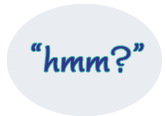I recently read a book where the hero frequently answered questions with “umm.” This got really annoying for me, but not for the reason you might think. I wouldn’t have minded the repetition if it had been “mmm” instead.
I’m not knocking this book, by the way. It is actually on my keeper shelf. It is just that to me these little consonant rich quasi-words each have their own meaning.

For me, “mmm” is a noncommittal sound that could mean I agree with you but more likely means I’m going to let you think I agree with you even if I don’t. I think this is what the author was going for—trying to create an enigmatic hero that didn’t want to lie, but wasn’t ready to reveal the whole truth about himself.
But she chose to use “umm,” which to me indicates a hesitation due to uncertainty. Someone who has been put on the spot, feels unsure, or is nervous about speaking in public might pepper their speech with this sound, but I don’t think the author meant to make her hero seem nervous. Each time the hero made the “umm” noise it threw me out of the story. But, maybe other people would only read it that way if she added an “h” as in “uhm.”

It would have been a little better if she’d chosen to use “hmm,” which often implies a question. That might have made me think the hero was hard of hearing, but maybe not. I don’t feel nearly as strong about “hmm”.
I hope this post on umm, mmm, and hmm has been of some use to you.
UPDATE: This blog is now closed. If you would be interested in more posts about language, writing, or book marketing; please visit me at www.CharleeCreative.com.

I agree with your definitions. But ‘mmm’ in the right context can also mean the person finds something appealing.
“Mmm, that bread smells wonderful.”
I think ‘umm’ would throw me out too unless it was to show hesitation or uncertainty.
Glad it’s not just me! Yes, mmm is a versatile little sound. 😉
LOL I can’t say “umm” vs “hmm” vs “mmm” have ever bothered me, but I can see the difference when you point it out. I wonder if it’s a copy editor’s decision? Maybe they like one over the other? Really, I’d read them all the same in the context of the sentence.
You’re so picky! 🙂
Picky…that’s me, all right! I do like these sound words. They add a nice sensory layer to the writing. But I want the right one.
In the Outlander books, the hero often says “mmphmm.”
My high school English teacher banned the use of the word UMM in the classroom. It was good to break the habit of saying it… but now when I’m listening to someone speak (like the TA in my college geology class), sometimes all I focus on is when they say UMM.
My high school English teacher banned the word shame as in “for shame.”
IMHO
umm = hesitation
mmm = agreement
and the almighty hmm = is pondering the mysteries of modern English
I don’t care for any of them.
All three can be more vividly expressed with body language.
But then my characters never hesitate, rarely agree, and usually abuse, rather than ponder, the intricacies of verbal communication.
Maybe something like this is just what Madeline needs–since she isn’t a talkitive one. Or maybe a humph. 😉
umm = don’t know whats what
mmm = i’m hesitating before choosing
hmm = well imagine that
Does that sound similar to your thoughts?
Sounds right to me. I think we also rely on inflection to get the meaning, but you loose that in writing.
Funny you should bring up this subject. I took a transcription test a few days ago and the instructions were quite specific on the spelling and usage on non-words used to indicate yes, no, pleasure, and contemplation. Um-huh means yes, uh-uh = no, mmm for pleasure, and umm as contemplation. I’ve read each of these sounds written in a variety of ways in many novels and only a few times couldn’t figure out what the author intended. I think mmm could easily be used as a noncommittal response to a statement or question, and umm to indicate uncertainty.
I can see how something like that can jump out at you and then everytime you see it your mind stops on that one word while you contemplate its usage.
Interesting that your transcription test included meanings for these non-words. I would have thought you’d leave out the umms in transcription.